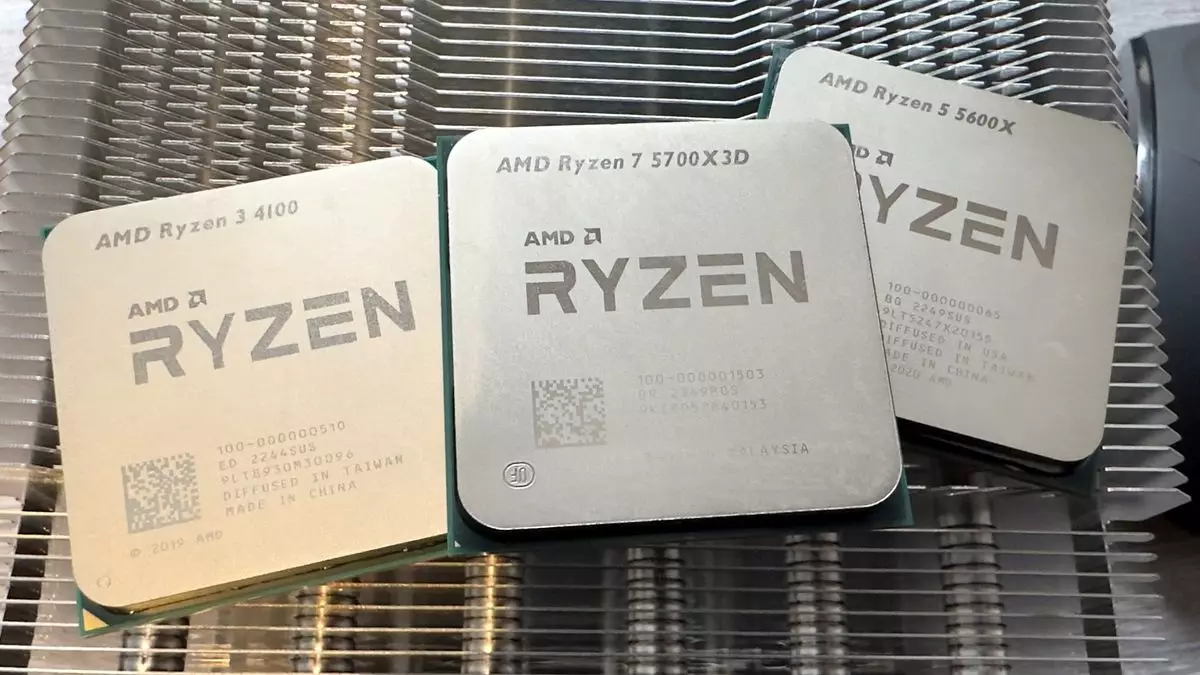AMD continues to dominate discussions surrounding the CPU market with its ongoing enhancement of the AM4 platform, much to the delight of its user base. While the introduction of the Ryzen 9000-series processors using the AM5 socket has marked a significant forward stride, AMD’s apparent commitment to the legacy AM4 platform remains noteworthy and promising. The upcoming Ryzen 5000-series processors, the Ryzen 5 5600T and 5600XT, are expected to launch soon, igniting excitement among enthusiasts and gamers alike.
AMD’s strategy to extend the life of the AM4 socket is a shrewd maneuver, as it caters to existing users who may want to upgrade without the need to overhaul their entire system. Reportedly, the Ryzen 5 5600T and 5600XT have begun popping up on various motherboard manufacturers’ websites, indicating that their release might be on the horizon. This ongoing support for AM4 is particularly significant given that many PC builders have invested in systems around this familiar architecture. Rather than forcing users to adopt newer (and potentially more expensive) technology, AMD fosters a sense of continuity, which is incredibly valuable in a world where technological advancements happen at a breakneck pace.
During previous chip releases over the past couple of years, AMD has introduced a variety of processors under the Ryzen 5000 umbrella, including the notable 5600X3D and the higher-end 5800XT and 5900XT models. The Ryzen 7 5700X3D has been critically acclaimed, especially for gamers looking for maximum performance without breaking the bank. Speculations about the Ryzen 5 5500X3D have recently taken a backseat, but the buzz surrounding the new 5600X variants certainly reignites interest in affordable, high-performance computing options.
The Significance of Suffixes: What Do They Really Mean?
Historically, AMD has used suffixes to delineate the characteristics of its processors; however, the meaning of the ‘T’ suffix has evolved. Originally designated to indicate low-power variants, it now appears to simply denote a refreshed model without the expected power-efficient upgrades. In the case of the 5900XT, there is no discernible difference in thermal design power (TDP) when compared to its predecessor, the 5900X. In fact, some ‘T’ variants like the 5800XT showcase enhanced capabilities, which complicates the clarity surrounding the naming conventions. Are they simply filling the gaps in their product lineup, or is it a strategic decision to captivate users looking for refined CPUs?
With the newly anticipated 5600T and 5600XT, benchmarks suggest potential base clock varieties, with a speculative boost clock enhancement over non-refreshed components, making them ideal for gamers seeking competitive edges. If AMD can deliver these updates while simultaneously reducing price points, it will likely create a sweet spot for budget-conscious builders who seek maximum value from their investments.
A transformative aspect of these upcoming processors is their potential pricing strategy. The existing Ryzen 5 5600X is currently retailing for around $128, which already represents a good value proposition for budget gamers. However, if AMD manages to unveil the 5600T and 5600XT at slightly lower price points with enhanced clock speeds, the benefits for budget PC builders could be profound. Imagine a CPU that tops out with increased clock speeds while maintaining an efficient TDP—this could redefine entry-level gaming performance thresholds.
While enthusiasts await concrete specifications and official announcements from AMD, it is essential to recognize the broader implications of these moves. The Ryzen lineup continues to not only compete with Intel on performance but also on value—a crucial aspect for gamers, DIY system administrators, and those simply looking to refresh aging hardware.
Final Thoughts: Anticipation and Speculation
As we remain on the cusp of AMD’s latest offerings in the 5000-series, it’s tantalizing to consider what the future holds. While all speculation hinges on AMD’s marketing strategists and engineers, there is a glimmer of hope for users looking for effective upgrade paths without the hefty financial burdens of more recent technologies. AMD’s AM4 platform, with its rich history of performance and value, stays relevant in the marketplace, ensuring that the desire for more affordable alternatives will continue to shape the computing landscape. The coming weeks will be pivotal in determining the fate of the Ryzen 5600T and 5600XT, as AMD holds the keys to either reaffirming its legacy or stepping into new realms with its innovative Ryzen 9000-series processors. The future looks promising for AMD fans and community enthusiasts alike, ready to embrace the next wave of computing advancements.


Leave a Reply